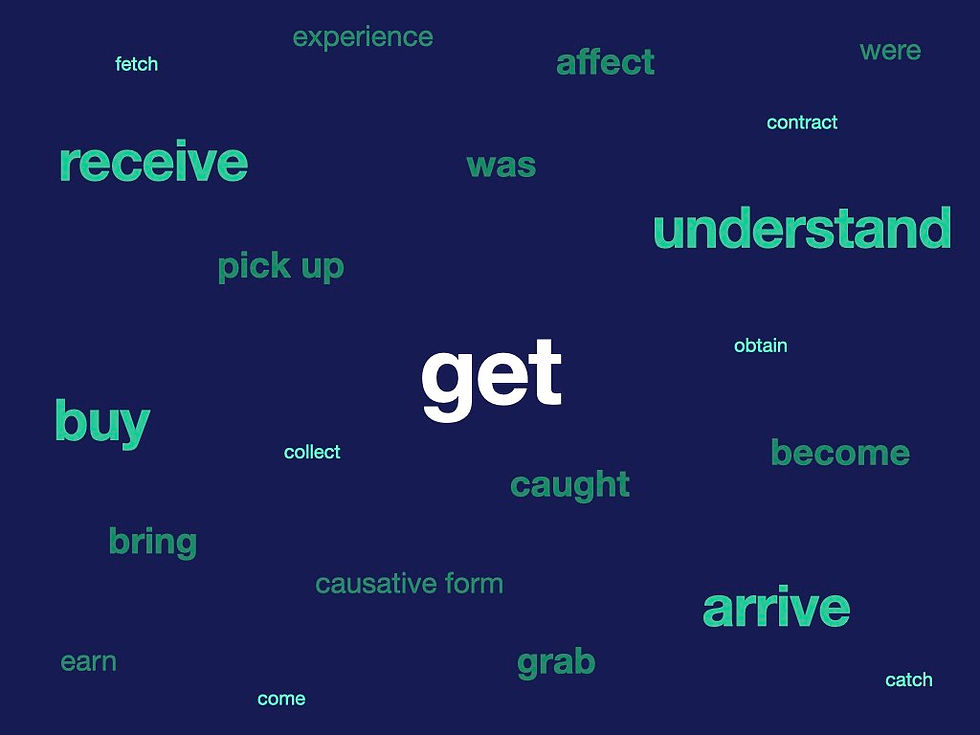The Many Meanings of "Get" — One Verb, So Many Uses!
- Thomas

- Jun 22, 2025
- 3 min read
Updated: Jul 2, 2025

Some of my English students have been noticing something strange lately: the verb "get" is everywhere. Native English speakers, like myself, will use "get" in many of their sentences, but what does it even mean? Is it different every time? When are we not allowed to use it?
Sometimes 'get' can mean "arrive," sometimes "receive," sometimes "understand" and sometimes "become." Other times 'get' can replace a more specific verb entirely.
In fact, "get" is one of the most versatile (can change easily) and informal verbs in English. In casual speech, it often replaces more specific verbs—sometimes we do it to sound more natural, sometimes we do it just out of habit.
Let’s look at the main uses of "get," what they really mean, and when it’s okay to use them. Don't forget to test your knowledge with the mini quiz down below!
The Many Meanings of "Get":
1. Get = Receive / Obtain / Buy
Examples:
I got a package in the mail. → received
Did you get my message? → receive
Can you get some milk at the store? → buy
She got a new phone yesterday. → bought/received
2. Get = Arrive
Examples:
What time did you get there? → arrive
We got home around 10 p.m. → arrived
Has the package gotten there yet? → arrived
3. Get = Become (Change of state)
Examples:
It’s getting dark outside. → becoming
He got angry when he heard the news. → became
She got sick last week. → became ill/sick
4. Get = Understand
Examples:
Do you get what I mean? → understand
I don’t get this part of the lesson. → understand
I don't get it. → understand
5. Get = Bring / Fetch / Grab
Examples:
Can you get my bag for me? → bring
I’ll get the door. → go open it
Go get your coat! → fetch, bring
Can you get the umbrella on your way out? → grab
Advertisement
6. Get = Have something done / Cause something to happen
This is the causative form. The causative form is when one person causes another to perform an action for them.
Examples:
I got my hair cut. → I had someone cut it for me
We got the car fixed yesterday. → We had someone repair the car for us
He got me to help him move. → He persuaded or made me help him move
7. Get = Catch / Contract (for illnesses)
Examples:
He got a cold last week. → caught
I think I’m getting sick. → contracting; I'm not sick yet, but I feel like I will be soon
8. Get = Be affected by / Experience
Examples:
I got hit by the ball. → I was hit
We got stuck in traffic. → We were stuck
She got caught in the rain. → She was caught
When NOT to Use "Get"
❌ In academic essays: She got sick → She became ill
❌ In business emails: I got your report → I received your report
❌ In news articles: He got in trouble → He was reprimanded
❌ In an interview: I got a degree in finance → I obtained a degree in finance
The more serious or professional your tone needs to be, the less you should use "get". Choose a more specific verb whenever you need to sound professional. It can often times be okay to use "get" in the workplace during a spoken conversation, e.g. "I got the email you sent me," but we try not to use it in our writing in the workplace.
Tip:
Remember, when you're at work it's usually okay to use "get" when speaking, but not okay when writing.
Mini Quiz
Choose the best replacement for "get" in the following sentences:
He got a new watch last weekend.
a) became
b) received
c) arrived
d) brought
They got to the party late.
a) received
b) arrived
c) understood
d) bought
She got tired after the run.
a) became
b) arrived
c) caught
d) understood
Can you get that book for me?
a) understand
b) buy
c) grab
d) become
I didn’t get the joke.
a) arrive
b) buy
c) understand
d) become
Answers
b) received
b) arrived
a) became
c) grab
c) understand
Final Thoughts
"Get" is flexible (can change easily) and everywhere—but don’t use it when you need to be specific or sound professional. As a learner, knowing how "get" is used in casual vs. formal settings will make your English more natural and more accurate.
Are there any examples I missed in this article? Or maybe you have a question about a specific sentence you've seen before? Leave a comment below and we can discuss it!


